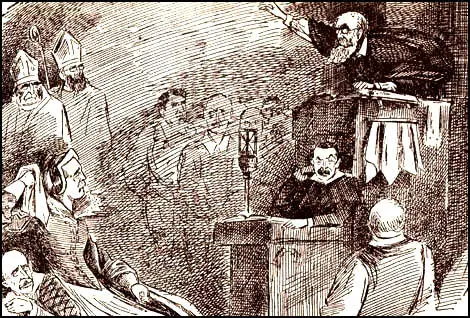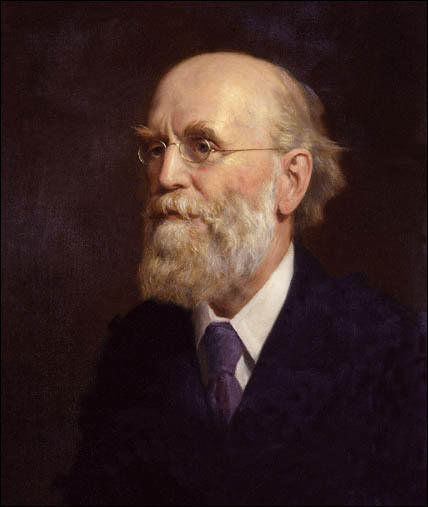1902 Education Act
On 24th March 1902, Arthur Balfour presented to the House of Commons an Education Bill that attempted to overturn the 1870 Education Act that had been brought in by William Gladstone. It had been popular with radicals as they were elected by ratepayers in each district. This enabled nonconformists and socialists to obtain control over local schools.
The new legislation abolished all 2,568 school boards and handed over their duties to local borough or county councils. These new Local Education Authorities (LEAs) were given powers to establish new secondary and technical schools as well as developing the existing system of elementary schools. At the time more than half the elementary pupils in England and Wales. For the first time, as a result of this legislation, church schools were to receive public funds. (1)
Nonconformists and supporters of the Liberal and Labour parties campaigned against the proposed act. David Lloyd George led the campaign in the House of Commons as he resented the idea that Nonconformists contributing to the upkeep of Anglican schools. It was also argued that school boards had introduced more progressive methods of education. "The school boards are to be destroyed because they stand for enlightenment and progress." (2)
John Clifford and Passive Resistance
John Clifford became the leader of the campaign against the legislation. Clifford was opposed to Balfour's bill for three main reasons: (1) the rate aid was being used to support the teaching of religious views to which some rate-payers were opposed; (2) sectarian schools, supported by public funds, were not under public control; (3) teachers in sectarian schools were subject to religious tests.
John Clifford prepared a plan of "Passive Resistance". It was based on the strategy used by John Hampden against Ship Money in 1637 and one of the causes of the English Civil War. "Its tactics were to be those of the old Tithe War: refuse to pay the abhorrent education rate, submit rather to the forced sale of your goods and even of your house; if need be, go to jail!". (3)

Clifford argued that people who disagreed with the proposed Education Act should refuse to pay at least that portion of the rate which was to be spent in or on church schools. The National Passive Resistance Committee was set-up with the motto "No Say. No Pay". However, within weeks the Anti-Martyrdom League was formed to pay the rates that the passive resisters withheld. (4)
In July, 1902, a by-election at Leeds demonstrated what the education controversy was doing to party fortunes, when a Conservative Party majority of over 2,500 was turned into a Liberal majority of over 750. The following month a Baptist came near to capturing Sevenoaks from the Tories and in November, 1902, Orkney and Shetland fell to the Liberals. That month also saw a huge anti-Bill rally held in London, at Alexandra Palace. (5)
1902 Education Act
Despite the opposition to the new Education Act, it was passed in December, 1902. John Clifford, wrote several pamphlets about the legislation that had a readership that ran into hundreds of thousands. Balfour accused him of being a victim of his own rhetoric: "Distortion and exaggeration are of its very essence. If he has to speak of our pending differences, acute no doubt, but not unprecedented, he must needs compare them to the great Civil War. If he has to describe a deputation of Nonconformist ministers presenting their case to the leader of the House of Commons, nothing less will serve him as a parallel than Luther's appearance before the Diet of Worms." (6)
Rate refusals began in the spring of 1903. "What normally happened was that sufficient of their goods should be distrained and auctioned to defray the rate. It was usually arranged for a friend of the refuser should be on hand to buy back the goods." Over the next four years 170 men went to prison for refusing to pay their school taxes. This included 60 Primitive Methodists, 48 Baptists, 40 Congregationalists and 15 Wesleyan Methodists. John Clifford never went to prison but he appeared in court on 41 different occasions over the next ten years. (7)

The father of Kingsley Martin, was one of those who refused to pay: "Each year father and the other resisters all over the country refused to pay their rates for the upkeep of Church Schools. The passive resistors thought the issue of principle paramount and annually surrendered their goods instead of paying their rates. I well remember how each year one or two of our chairs and a silver teapot and jug were put out on the hall table for the local officers to take away. They were auctioned in the Market Place and brought back to us." (8)
David Lloyd George made clear that this was a terrible way to try and change people's opinions: "There is no greater tactical mistake possible than to prosecute an agitation against an injustice in such a way as to alienate a large number of men who, whilst they resent that injustice as keenly as anyone, either from tradition or timidity to be associated with anything savouring of revolutionary action. Such action should always be the last desperate resort of reformers... The interests of a whole generation of children will be sacrificed. It is not too big a price to pay for freedom, if this is the only resource available to us. But is it? I think not. My advice is, let us capture the enemy's artillery and turn his guns against him." (9)
Primary Sources
(1) Kingsley Martin, Father Figures (1966)
My father was involved in the passive resisters' fight against Balfour's Education Act of 1902. Each year father and the other resisters all over the country refused to pay their rates for the upkeep of Church Schools. The passive resistors thought the issue of principle paramount and annually surrendered their goods instead of paying their rates. I well remember how each year one or two of our chairs and a silver teapot and jug were put out on the hall table for the local officers to take away. They were auctioned in the Market Place and brought back to us.
Mother and I were taken for our first motor ride to one of these village auctions where father would explain the nature of passive resistance before the sale began. We drove to a village some fifteen miles away, sometimes travelling at the frightening speed of twenty miles an hour. In those days roads were deep in dust, and you could tell if a car had passed because the hedges were white. I remember three small boys running behind each other pretending to be a motor. The first said he was the driver, the second a car, and the third the smell.

